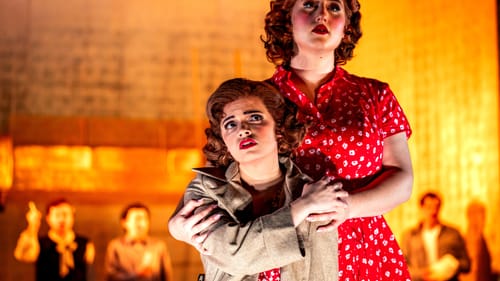Stay in the Loop
BSR publishes on a weekly schedule, with an email newsletter every Wednesday and Thursday morning. There’s no paywall, and subscribing is always free.
An inventive double bill on 20th-century women
Curtis Opera Theatre presents Les Mamelles de Tirésias and The Seven Deadly Sins

Francis Poulenc’s Les Mamelles de Tirésias and Kurt Weill’s The Seven Deadly Sins (with a libretto by Bertolt Brecht) each offer a view of the repressive and often degrading choices women faced in the mid-20th century. Curtis Opera Theatre presented the short works together last weekend on an inventive double bill at the Philadelphia Film Center.
What Poulenc and Weill knew
As a queer man living in a conservative Catholic country, Poulenc understood the price paid by those who step outside of social norms. In Tirésias, he chronicles with impish wit the journey of a housewife who sees no other option to escape her domestic toil than transforming herself into a man. Meanwhile, her husband, left with no one to issue children, must devise a means to procreate on his own. The work’s title cheekily refers to the Greek soothsayer who inhabited both male and female sexes over the course of a long life.
Weill was long fascinated with America, even before he emigrated to New York in 1935, and the musical and cultural stamp of the country can be gleaned all over The Seven Deadly Sins. Part song cycle and part ballet, it tells the story of a resourceful woman and her sister—who is potentially another outward reflection of herself—who travel from coast to coast for seven years, earning money to put toward a comfortable life back home in Louisiana.
Symbolic and entertaining
Director Eve Summer offered a cleverly symbolic and highly entertaining production, with both works unfolding on a candy-colored set designed by Cameron Anderson. A baby carriage hung suspended above the stage throughout Tirésias, replaced by a pleasant little house for The Seven Deadly Sins: twin objects of obsession that are never far from the minds of the characters. Summer drew a madcap, surrealist vibe from the performers in Tirésias—Poulenc was inspired by the works of Guillaume Apollinaire, who literally coined the term—and a more austere style for The Seven Deadly Sins. Both were engrossing in their own ways.
The quality of musical performance remained in top form throughout. In Tirésias, Juliette Tacchino brought a sparkling personality and a fearless high soprano to the title role. Her language skills as a native French speaker were certainly appreciated. Baritone Erik Tofte was appropriately exasperated as her husband, Le Mari. Baritone Nathan Schludecker was puckish as Le Directeur, who sets the plot in motion by declaring that French citizens should have as many babies as possible. Although the libretto mentions 40,049 babies born to Le Mari in a single day, a smaller number materialized on stage—but kudos to the Curtis ensemble for donning rompers and tumbling around like infants.

Mezzo-soprano Katie Trigg brought a sultry sense of world-weariness to Anna I in The Seven Deadly Sins. Maya Mor Mitrani, a soprano, was a distinctive presence in the non-singing role of Anna II. Together, they convinced the viewer that they were two halves of the same person. Evan Gray, Morgan-Andrew King, Hongrui Ren, and Landry Allen rounded out the chorus as the various men who inhabit the sisters’ lives across their seven-year odyssey.
Continuing an inventive streak
Conductor Michelle Rofrano led both works with distinction, finding especially pleasant colors in the jazzy expanses of Weill’s score. The overall production, with fine costuming by Whitney Locher and lighting design by Steve Shack, was on par with anything one might expect from a professional company choosing to present these works. Curtis has supplied some of the most inventive opera productions Philadelphia has seen in recent years, and the streak continued here.
What, When, Where
Les Mamelles de Tirésias, by Francis Poulenc; The Seven Deadly Sins, music by Kurt Weill and libretto by Bertolt Brecht. Curtis Opera Theatre. Friday, March 15, and Sunday, March 17, 2024, at the Philadelphia Film Center, 1412 Chestnut Street, Philadelphia. (215) 893-5252 or curtis.edu.
Accessibility
The Philadelphia Film Center is a wheelchair-accessible venue.
Sign up for our newsletter
All of the week's new articles, all in one place. Sign up for the free weekly BSR newsletters, and don't miss a conversation.

 Cameron Kelsall
Cameron Kelsall